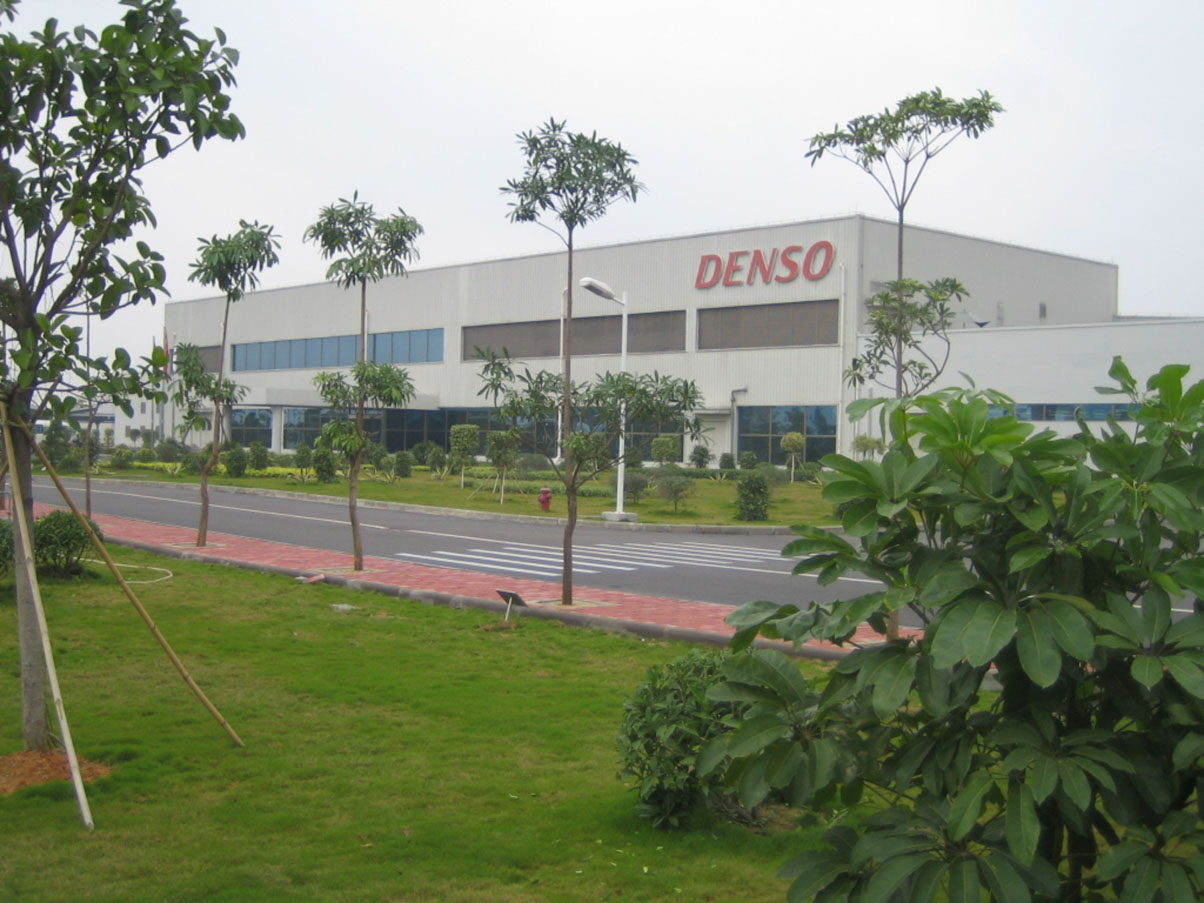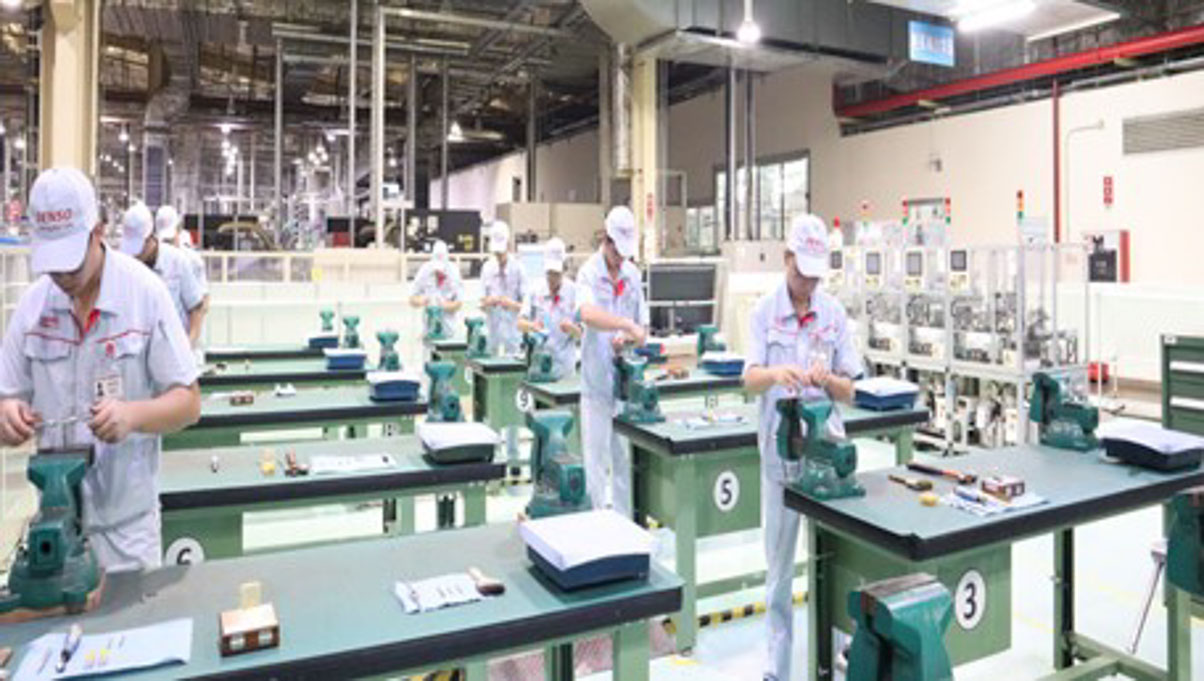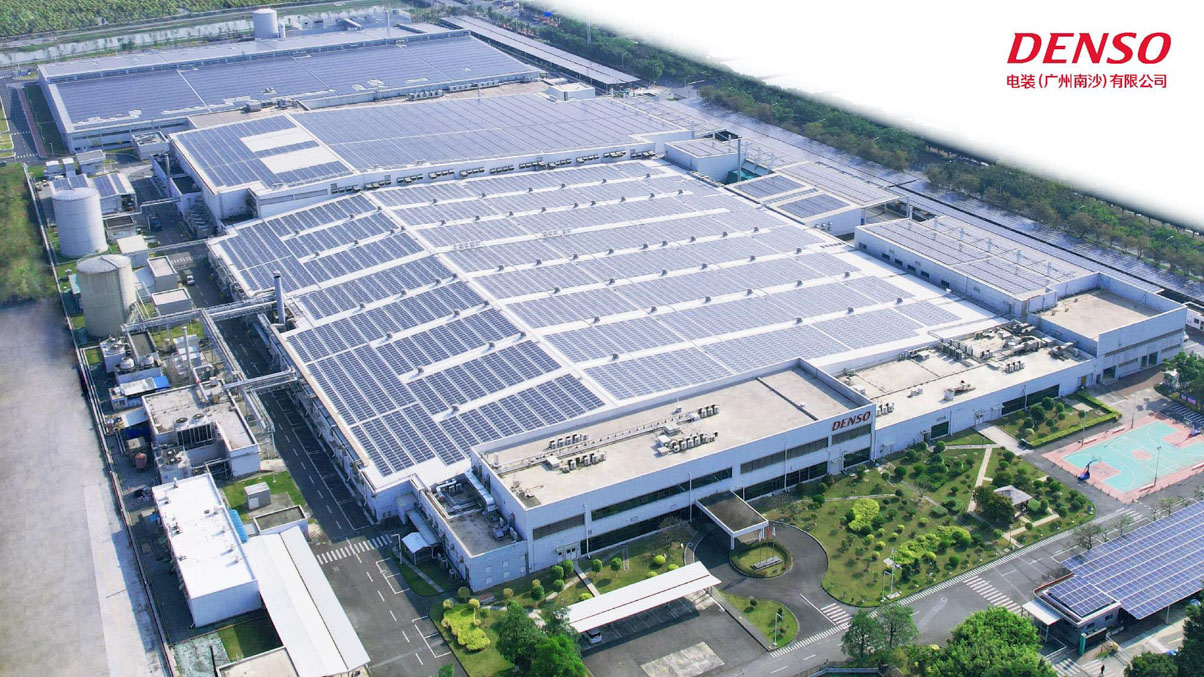4. DENSO (Guangzhou Nansha) Co., Ltd. (DMNS) established
1. DENSO (Guangzhou Nansha) Co., Ltd. established
Since China’s reform and opening-up, the South China region has rapidly grown into an important market for the entire country’s economy, while also becoming an important supply base for the automotive industry. From the early 2000s, Honda had already produced the Accord and the Odyssey in its joint venture with Guangzhou Automobile, Guangqi Honda. With Toyota Motor Corporation also announcing the establishment of a joint venture company with Guangzhou Automobile, GAC Toyota, the automobile industry in South China was entering a period of vigorous development. To respond strategically to this expansion of major car manufacturers in South China, we began to examine the possibility of establishing a plant in the region. After considering several candidate sites in the Guangzhou area, we decided to establish a plant in the Nansha Development Zone of Guangzhou, which has been developed as a national-level project, as the sole investor, taking into consideration the ideas of GAC Group, a cooperative partner of Guangzhou DENSO since our establishment, its shareholder, Guangzhou City, and Toyota Motor Corporation, which decided to locate its plant in Nansha. In July 2004, DENSO (Guangzhou Nansha) Co., Ltd. (hereinafter, “DMNS”) was officially established and positioned as a production base for powertrain-related products. Established after much deliberation, DMNS was the first solely owned subsidiary established by DENSO in China and served as a model for the establishment of subsequent solely owned subsidiaries.

(2005)
Nansha in those days consisted entirely of banana plantations, so these had to be converted into industrial sites where factories could be built. Urban development was also in its initial stages, and transportation infrastructure was inadequate. Because of this, traveling from Guangzhou to DMNS took two to three hours (now about one hour). To secure employees from all over the country and in Guangzhou, the company established a dormitory (where 50% of employees lived; currently, 5%) and operated more than 10 commuter buses from Guangzhou every day. The factory (currently Plant No.1) was completed in August 2005, and shipments began that November, starting with injector horns. After that, in the two years until 2007, mass production of 11 products (VCT, SIFS, etc.) began. The former System Control Components Product Division (now the Mechatronic Systems Division), which handled the core product VCT, became the purchasing product division and established the production base that remains in place to this day. In 2007, the company also established China's only Machinery & Tools Division, and a system put in place to support the expansion of local production for DENSO China as a whole.
2. Period of expansion (2007 to 2019)

Phase 2 expansion of Plant No.1 was conducted in 2007 to accommodate rapid expansion of the market. In 2008, the company won the President's Award for Excellence for the first time, in recognition of our operating income turnaround as well as our efforts toward quality levels and localization of company management. In 2010, we began mass production of safety-related products (wheel speed sensors and crash sensors), marking a step forward as a manufacturing complex.
Meanwhile, it could be foreseen that lines would become more automated and equipment more sophisticated, creating an urgent need to train high-skilled and ready-to-work personnel. Therefore, using DNJP’s DENSO Gakuen as a model, we established Nansha Gakuin (currently Nansha Gakuen) in 2011. (As of 2023, it has produced 140 graduates from 12 terms, who now serve as core human resources utilizing the knowledge and skills they have learned in production, maintenance, machinery & tools, production engineering, and quality assurance.)
In 2011, the company received the President's Award for Excellence for the second time in recognition of our proactive human resource development, including at Nansha Gakuin and in DNJP reverse transfers, our response to foreign exchange fluctuations through parts localization and in-house production, and our high profit margins.
We promoted human resource development (training of self-maintenance personnel and equipment experts) in an honest manner, and from 2013, DMNS was gradually able to achieve equipment rationalization, add-on automation, and AGV installation by itself.
In 2016, DMNS received the President's Award for the third time in recognition of such unique initiatives and our efforts for speedy plant transformation. Also in 2016, we completed the phase 3 expansion of Plant No.1, and in 2019, we started mass production of ELCM, a product that complies with environmental regulations. Furthermore, the company merged Guangzhou Asmo and added motor products, growing to a base with sales of over four billion yuan in four business groups and six divisions (in 2019).
3. Supporting electrification and intelligence (Operation of Plant No.2)
With the advent of the CASE era, the need for electrification and intelligence was growing in the Chinese market. To realize stable supply in a vast land area and meet customers' demands for proximity, the Electronics Group’s supply policy was changed from one-region-one-production-base to a two-pole (north and south) production system (TDE and DMNS), and its electronics plant (Plant No.2) was completed in September 2020. Although the Covid-19 pandemic was making it difficult to travel to and from Japan, 33 key personnel from the departments of production, production technology, maintenance, and quality assurance who had trained at Plant No.1 were dispatched to TDE for an extended duration to acquire technologies and skills. With remote support from mother company DNJP in starting up the production line, we were able to begin mass production in July 2021, starting with engine ECUs. A further 38 lines for 13 products were sequentially launched by 2023.
Meanwhile, in Plant No.1, mass production of products required for electrification began in quick succession (SBW actuators in 2021 and electric VCTs in 2022). In addition to locally procuring highly complex parts and equipment, we started up these lines with mainly national staff in the midst of the Covid-19 pandemic, in the same way as the Plant No.2 start-up, and achieved stable operations. As a result of these efforts, sales soared to 4.9 billion yuan in 2022.
We plan to launch PCUs in 2024 and brake ECUs in 2025, and with four business groups and nine divisions, we are literally developing into a manufacturing complex.
4. Toward future development

Since our establishment in 2004, we have overcome numerous difficulties and developed into a manufacturing complex in South China currently employing 2,000 people. Nansha District has also undergone significant development, and now 80% of our employees live there, making it increasingly important for us to coexist with and contribute to the local community, as well as to gain their cooperation and understanding. In 2019, we established the four common values of “growth,” “vigor,” “contribution,” and “sincerity” through discussions among our national staff themselves, in the hope of further development and growth of DMNS and each of our employees, and being a company that is “demanding at work, but friendly like a family.” Furthermore, from the preparation stage of Plant No.2, under the slogans "an emerging sense of ownership" and "a sense of unity transcending business," a culture has taken root in which each individual, regardless of the business or product they are working on, thinks about what they should do for the development of DMNS and acts accordingly.
In addition, to help achieve carbon neutrality, we started solar power generation in January 2023 (13 million kWh, the largest power generation within DENSO China and the second largest in Nansha District), providing about 30% of our electricity needs. Together with our annual energy conservation activities and the purchase of renewable energy, we aim to achieve carbon neutrality by 2025.
As the Chinese automotive market continues to undergo rapid change, DMNS aims to be a company that is loved by our customers, community, and employees, and to be a real core manufacturing base for South China, by introducing new products that meet customer needs, nurturing honest human resources, and ensuring safety, quality, and competitiveness through the spread of our culture and values.